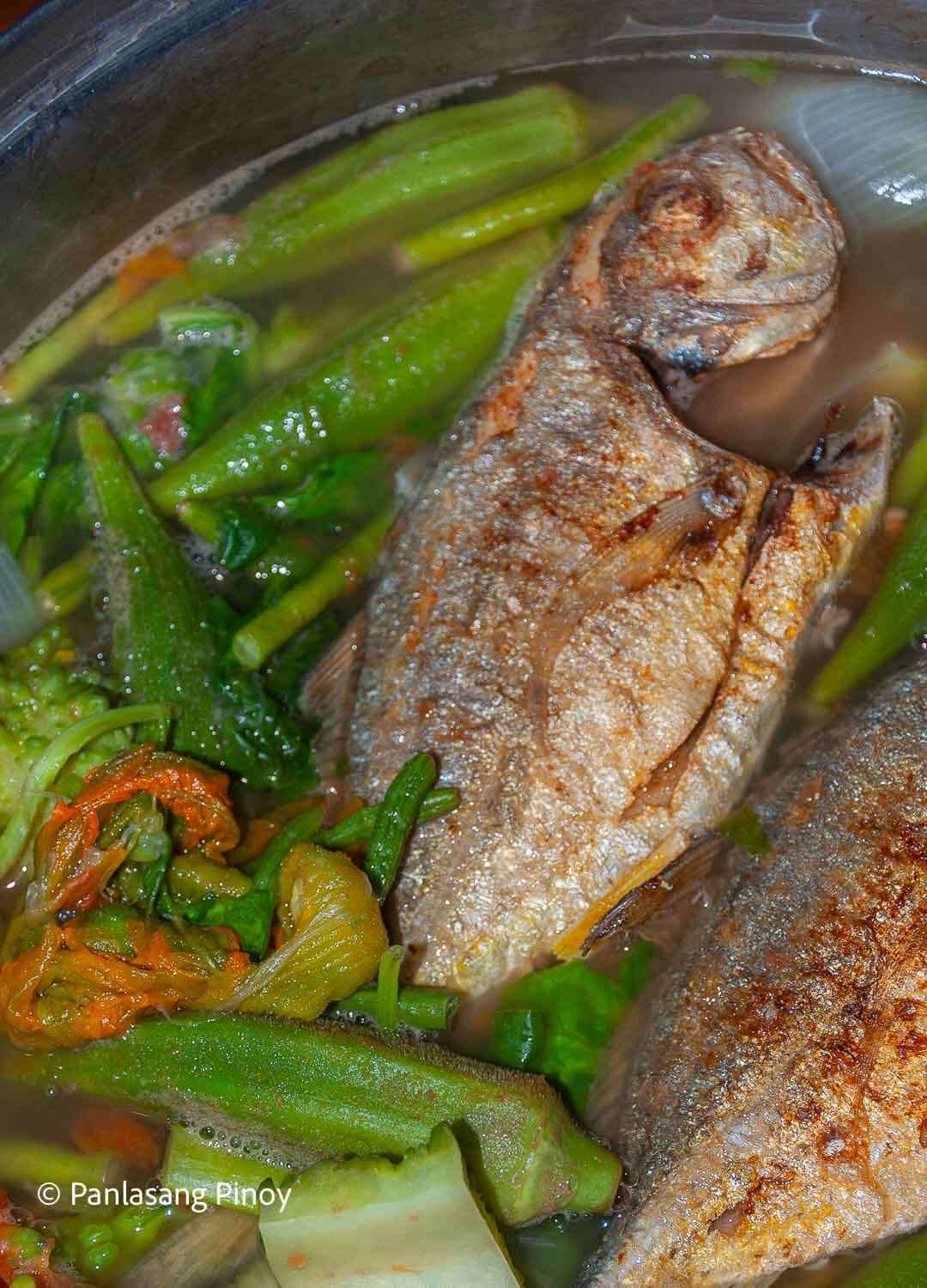
5.0 from 3 votes
Dinengdeng with Fried Fish Recipe
Dinengdeng with Fried Fish is a traditional Filipino dish featuring a savory vegetable stew cooked in a flavorful broth, paired with crispy, golden-brown fried fish. It combines a hearty mix of vegetables and fish, creating a delicious and nutritious meal that's perfect with a side of white rice.
Prep Time
5 mins
Cook Time
5 mins
Total Time
40 mins
Servings: 3 people
Calories: 539 kcal
Course:
Main Course
Cuisine:
Filipino
Ingredients
- 2 to 3 pieces medium sized fish cleaned
- 10 pieces okra
- 1 ½ cup squash flower
- 3 pieces bitter gourd ampalaya, cored and sliced
- 10 pieces snake beans sitaw, cut into short pieces
- 2 medium ripe plum tomato wedged
- 2 knobs ginger sliced
- 1 onion wedged
- 2 cups hot pepper leaves dahon ng sili
- 3 cups water
- 3 tablespoons bagoong monamon
- 1 tablespoon salt
- ½ cup cooking oil to fry fish
Instructions
- Rub salt all over the fish. Heat oil in a pan. Once the oil gets hot, fry the fish until the side turns golden brown. Turn the fish over and continue to fry the other side until the same color is achieved. Remove the fried fish from the cooking pot. Place in a plate and set aside.
- Pour water in a clean cooking pot. Let boil.
- Add onion, ginger, and tomato. Cover and boil in medium heat for 5 minutes.
- Stir-in the bagoong. Add okra, bitter gourd, and snake beans. Cover and cook for 7 to 12 minutes.
- Add the hot pepper leaves and squash flower. Cook for 3 minutes.
- Put the fried fish top. Cover. Cook for 1 minute. Transfer to a serving bowl.
- Serve. Share and enjoy!
Cup of Yum
Notes
- Dinengdeng and bulanglang are both tasty Filipino dishes but have some key differences. Dinengdeng is a vegetable stew often cooked with a flavorful broth and usually served with fried or grilled fish, while bulanglang can be similar in terms of the inclusion of a variety of vegetables. However, some versions of bulanglang version include protein, but the one that I am accustomed to (Ther Batangas version) only makes use of vegetables (no fish nor any kind of protein).
- In other words, both dishes are hearty and perfect with rice, but dinengdeng has a more pronounced savory taste due to ingredients like bagoong (fermented shrimp paste), while bulanglang tends to have a milder, simpler flavor.
Nutrition Information
Serving
3g
Calories
539kcal
(27%)
Carbohydrates
36g
(12%)
Protein
21g
(42%)
Fat
39g
(60%)
Saturated Fat
3g
(15%)
Polyunsaturated Fat
11g
Monounsaturated Fat
24g
Trans Fat
0.1g
Cholesterol
171mg
(57%)
Sodium
2913mg
(121%)
Potassium
1398mg
(40%)
Fiber
14g
(56%)
Sugar
15g
(30%)
Vitamin A
5642IU
(113%)
Vitamin C
144mg
(160%)
Calcium
256mg
(26%)
Iron
6mg
(33%)
Nutrition Facts
Serving: 3people
Amount Per Serving
Calories 539
% Daily Value*
| Serving | 3g | |
| Calories | 539kcal | 27% |
| Carbohydrates | 36g | 12% |
| Protein | 21g | 42% |
| Fat | 39g | 60% |
| Saturated Fat | 3g | 15% |
| Polyunsaturated Fat | 11g | 65% |
| Monounsaturated Fat | 24g | 120% |
| Trans Fat | 0.1g | 5% |
| Cholesterol | 171mg | 57% |
| Sodium | 2913mg | 121% |
| Potassium | 1398mg | 30% |
| Fiber | 14g | 56% |
| Sugar | 15g | 30% |
| Vitamin A | 5642IU | 113% |
| Vitamin C | 144mg | 160% |
| Calcium | 256mg | 26% |
| Iron | 6mg | 33% |
* Percent Daily Values are based on a 2,000 calorie diet.